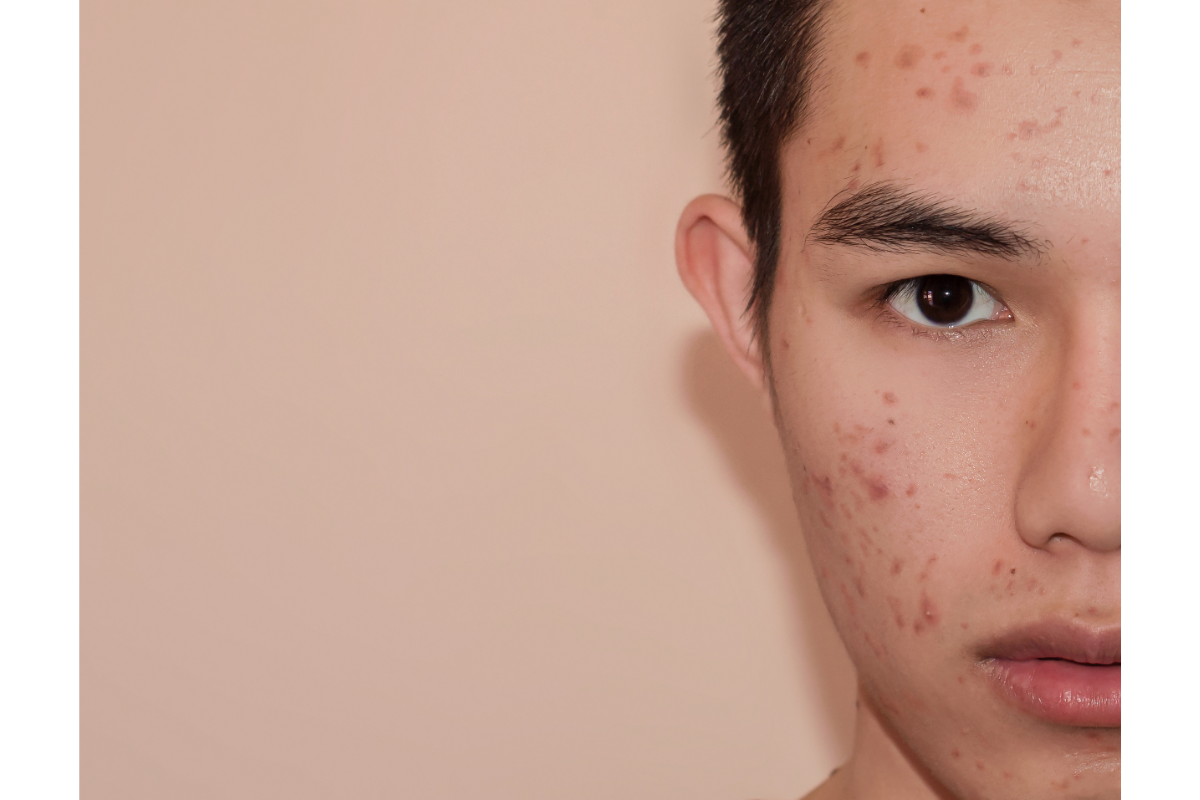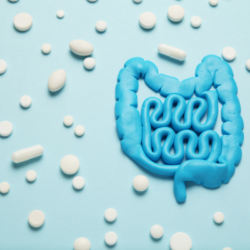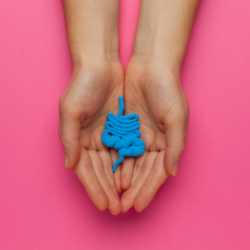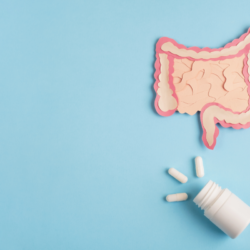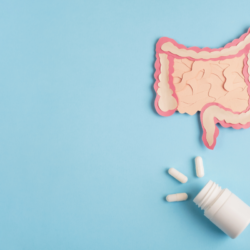Acne is a common skin problem among teenagers, which can lead to complexes and affect their self-confidence. Conventional treatments such as topical medication and antibiotics can have undesirable side effects. However, there is a natural alternative to combat teenage acne is the use of probiotics. In this article, we’ll explore the link between teenagers, acne and probiotics, and how these beneficial micro-organisms can help improve skin health in young people.
Teenagers, acne and probiotics: Understanding the link
Adolescence is a time of major hormonal upheaval, which can lead to skin problems, including acne. Acne occurs when the hair follicles in the skin become clogged with sebum, dead skin cells and bacteria. This obstruction leads to inflammation and the formation of acne pimples.
Probiotics, on the other hand, are living micro-organisms that can provide health benefits when consumed in sufficient quantities. They are often called ‘good bacteria’ because they help maintain a healthy balance of intestinal flora healthy balance of intestinal flora and to strengthen the immune system. However, probiotics can also have beneficial effects on skin health.
The “Gut-Skin” axis
The relationship between the gut microbiome and skin health, often described as the “gut-skin” axis, is a fascinating area of research that is gaining in importance, particularly in the context of teenage acne.
Gut-skin communication
The gut microbiome plays a crucial role in regulating our immune system and in systemic inflammation. Imbalances in the intestinal flora, known as dysbiosis, can affect not only digestive health but also skin health. This is due to the communication between the intestine and the skin via metabolic, immunological and neuroendocrine pathways.
Impact of dysbiosis on the skin
Intestinal dysbiosis can lead to an increase in intestinal permeability, often referred to as “leaky gut”. This allows potentially harmful substances to pass into the bloodstream, promoting systemic inflammation which can exacerbate skin problems such as acne or rosacea.
Probiotics: A healing link
Probiotics, by restoring the balance of the intestinal microbiome can help reduce inflammation and restore the integrity of the intestinal barrier. In doing so, they can reduce the negative impact on the skin, helping to manage and prevent acne.
Stress, the intestine and the skin
Stress is another factor influencing the gut-skin axis. It can disrupt the gut microbiome, increase intestinal permeability and aggravate inflammation, which in turn can trigger or exacerbate acne. Probiotics can help modulate the stress response, offering an indirect but significant benefit to skin health.
Probiotics and teenage acne: A potential solution?
Acne, a common skin problem among teenagers, could find a new ally in the fight against its effects: probiotics. Let’s explore the different ways in which these micro-organisms could be beneficial.
Reducing inflammation
Acne is an inflammatory condition. Strains of Lactobacilli and Bifidobacteria have been shown to reduce the release of pro-inflammatory cytokines (TNF- α, IL-6 and IL-8) and increase the release of anti-inflammatory cytokines (IL-10). This action could reduce the symptoms of acne.
Reduce oxidative stress
The body naturally produces free radicals, which can lead to an oxidative imbalance that contributes to inflammation, a key factor in acne. Certain probiotics are known to reduce oxidative stress markers, such as hydroperoxide, involved in acne.
Balancing intestinal dysbiosis
Probiotic supplementation can rebalance the intestinal microbiome, increasing beneficial bacteria and inhibiting the growth of more harmful ones. This rebalancing is essential for the overall health of the skin.
Inhibiting pathogenic bacteria on the skin
Bacteria naturally present on the skin, such as Staphylococcus epidermidis and Streptococcus salivarius, can inhibit the growth of Propionibacterium acnes, an acne-causing agent. Research is underway to develop skin care products containing these probiotic strains.
Maintaining the integrity of the intestinal barrier
Increased intestinal permeability, or ‘leaky gut’, can contribute to the development of acne. Probiotics strengthen the intestinal wall and inhibit the growth of pathogens that damage it.
Promoting intestinal health and regulating transit
People suffering from acne are often faced with digestive problems. Intestinal imbalance and leaky gut, common in those with intestinal irregularities, can aggravate acne. Probiotics could offer a solution to these problems.
Managing the effects of stress
Stress, a major trigger of acne, can affect the skin indirectly by causing intestinal dysbiosis and increasing intestinal permeability. Probiotics can help manage these effects, improving both mental and skin health.
It’s important to note that the effects of probiotics on acne can vary from person to person. Some people may see a significant improvement in their acne when using probiotics, while others may not notice any noticeable difference. It is also essential to choose specific probiotic strains and use them appropriately to achieve the best results.
How can probiotics be used to treat teenage acne?
There are different ways to use probiotics to treat teenage acne. Here are some common options:
- Probiotic supplements probiotic supplements are available in capsule, tablet or powder form. Recommend choosing supplements containing specific probiotic strains, such as Lactobacillus and Bifidobacterium, which have been shown to have beneficial effects on the skin. It is important to follow the manufacturer’s dosage instructions and consult a healthcare professional before starting any new supplement.
- Fermented foods fermented foods such as yoghurt, kefir, miso and kimchi are naturally rich in probiotics. Teenagers can include these foods in their daily diet to benefit from the positive effects of probiotics on their skin. It’s best to choose organic and unsweetened options to maximise the health benefits.
- Topical care some topical products contain probiotics that can be applied directly to the skin. These products help to restore the balance of skin flora and reduce inflammation. They can be used in conjunction with other acne treatments.
It’s important to note that probiotics are not an instant miracle solution for teenage acne. They can take time to show results and their effectiveness can vary from person to person. Before starting any new treatment, consult a healthcare professional.
Conclusion
Teenage acne can be a source of frustration and discomfort. Probiotics offer a promising natural alternative for treating teenage acne. By reducing inflammation, restoring the balance of skin flora, regulating sebum production and boosting the skin’s immune system, probiotics can help improve skin health in teenagers. However, it is important to choose the right probiotic strains and use them appropriately. You should therefore consult a healthcare professional for personalised advice on the use of probiotics for teenage acne.
In conclusion, probiotics offer a natural and safe approach to helping teenagers cope with acne. Their potential to reduce inflammation, restore the balance of skin flora and regulate sebum production make them an interesting option to complement conventional treatments. However, it is important to note that each individual is unique and results may vary. You should therefore consult a healthcare professional for advice tailored to your specific case.
FAQ
Q : Can probiotics make acne worse in teenagers?
A: In rare cases, probiotics can temporarily worsen acne in some teenagers. This may be due to an initial reaction of the skin to the introduction of new bacteria. However, this reaction is generally transient and disappears with time. Consult a healthcare professional if any deterioration persists.
Q : Are probiotics safe for teenagers with acne?
A : It’s always best to consult a healthcare professional before starting any new treatment. Especially if the teenager has underlying health problems or is taking other medication.
Q : How long does it take to see the results of probiotics on acne?
A: The results of probiotics on acne can vary from person to person. Some people may see an improvement in their acne within a few weeks, while others may need several months to see significant results. It’s important to be patient and to continue using probiotics consistently to get the best results.
Q : Can probiotics be used to prevent acne in teenagers without active acne?
A: They can help maintain a healthy balance of skin flora and boost the skin’s immune system. However, consult a healthcare professional to determine the best preventive approach for each individual.
Q : Are there any side effects associated with the use of probiotics in teenagers?
A: Some people may experience mild side effects such as bloating, gas or slight intestinal disturbance. These effects are generally temporary and disappear over time. Consult a health professional if persistent or serious side effects occur
References :
- https://www.ncbi.nlm.nih.gov/pmc/articles/PMC8953587
- https://www.mdpi.com/2079-9284/10/3/77
- https://pubmed.ncbi.nlm.nih.gov/30042740/
- https://pubmed.ncbi.nlm.nih.gov/30101990/
- https://pubmed.ncbi.nlm.nih.gov/32266790/

